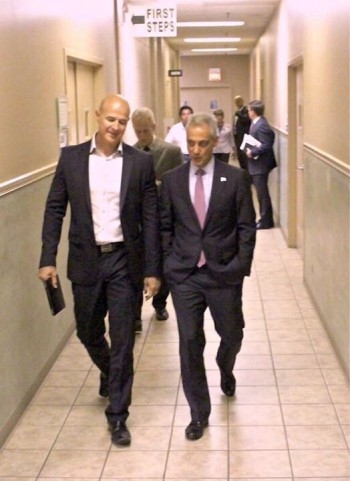
I love this picture.
I saw it on Mark Jobe’s Facebook page. Mark is a pastor of a church I greatly admire in Chicago. Actually, as a church planter and revitalizer, I’ve probably referred people to New Life (and a video of their work I keep bookmarked) as much as any other church.
New Life is doing what I believe is some of the best, hardest and most needed work in church growth today. They come along side an older, declining, established church and breathe “new life” into them helping them reach the community again. There are many other churches doing similar work, but I have been to New Life and had the opportunity to talk with Mark a few times, so he’s one doing this type ministry I’m familiar with most. I don’t know Mark well — but we are close enough to be Facebook friends
In this picture, Pastor Mark is walking with Chicago Mayor Rahm Emanuel. According to the caption, Mark was “Discussing the challenges of providing a safer environment and better role models for Chicago school children with the Mayor”
I love it!
Yea Mark! Yea New Life! Yea God!
The thought that struck me with this picture is that it provides further proof of something I’ve believed for some time. Something I’ve been living and preaching.
It’s how I’m trying to do church growth today.
To be a kingdom building pastor you MUST be a community building pastor.
You simply have to be! I’m convinced.
Okay, maybe must is too strong a word. Sometimes I use titles to get you to read — because I am making a point I believe is important. And, let me be clear there are many other effective models of doing ministry than Mark’s and certainly mine. But, being a community builder seems to be at least one of the more effective ways I’m seeing churches grow these days.
People aren’t coming to our big buildings anymore — or our small buildings. We must go to them.
Shortly after I arrived in Lexington I ran past a historical marker for the oldest home in our city. It was built for a Presbyterian pastor. The marker explains what a difference that pastor had on the city — not just as a pastor — but as a community leader. That’s because — years ago — pastors used to be at the center of everything in a community.
Pastors were community leaders — game changers in the community. They garnered respect through visibility and activity. People listened to them and wanted their opinion — mostly because people knew them well enough to respect them. They weren’t just faces on a raised platform on Sunday — they were faces seen in the community during the week. They were friends. Town folk.
One of my mentors, a pastor now in his mid-90’s, helped start a small business almost 70 years ago that is still thriving today in the community where his first pastorate was located. How? He walked the man desiring to open a business over to the bank and told the community banker to “give this young man a chance”. He got the loan. The pastor got a generous church donor. (Funny how that works.)
He could march over to the bank with a prospective loan because he was respected by the banker.
Now, things have changed. Banks don’t operate like that anymore. I’m not saying they ever will again. Most likely not.
But, not everything has to change.
The fact is, we didn’t just stop influencing the bankers — we stopped influencing our communities. Many times we left public square to hide behind our pulpits. And, I get it. For so long they came to us. We would build it — buildings and parking lots and programs — and they would fill them. We may need to wait for some tragic or life-altering events to occur in thie life, but they’d come.
But it doesn’t always work anymore — at least not as easily.
I’m convinced, many times they don’t trust us as much because they don’t know us as much.
I haven’t been in full-time vocational ministry long. I came out of the business world where I was very involved in community functions. Frankly, in my experience, the pastors who were active in community efforts weren’t respected because of the way they went about trying to make a difference. I know because I heard my friends who weren’t Christians talk about it. (That experience has greatly shaped my approach to doing ministry. Leading in the community — hoping to be a Kingdom builder.)
You knew what they were against, but you didn’t know what they were for. You knew what they didn’t like about the community, but you didn’t know what they liked about the community. You knew they took resources from the community to operate their programs — but you didn’t know how they gave anything back. Honestly, they were seen more as antagonistic than helpful in changing the community for good.
The community won’t stand for it anymore.
And, while much of that is perception more than reality — most pastors and churches do love their community, even if it’s not always visible. If the church does it’s job of making disciples of those who attend it should be helping the community by giving back citizens who have more joy, patience, love, etc. Who doesn’t want that? (I’ll let someone else decide if a particular church is actually producing Christ-like disciples.)
But wasn’t Jesus visible, known and well-liked in the community? Sure, they eventually rejected Him, but that was part of the plan — and He knew it was coming — and that didn’t deter Him from loving the people outside the walls of the synagogue. Jesus proved you could be in the world without being shaped by the world.
And, by being in the world, we stand a far better chance of helping to shape it.
Frankly, if all the community knows is the perceptions they see — and, they are more against a community than for it — I don’t blame them for rejecting our message.
And, so, I contend again…
To be a kingdom building pastor you have to be a community building pastor.
So, we need to be involved in our schools.
We need to be involved in addressing the greatest needs of our community.
We need to know our school and city leaders and help them understand we are here to be part of the solution — not to add to the stress of their jobs.
We need to earn the respect of people in the community — some who will never enter the doors of our churches — so we can help build our communities.
Only then, in my opinion, can we most effectively build the Kingdom today. And, in my honest opinion, it’s the right thing to do even if the church never grows another member from it.
So, let me ask some sobering questions.
Pastor, how are you investing in your community?
How are you becoming a community leader/influencer?
Does the community know you — as more than just a name on a sign outside your building?
If so, do they like who they are getting to know?





 Logging you in...
Logging you in...
 To Be A Kingdom Building Pastor Today... […]
To Be A Kingdom Building Pastor Today... […]  Loading IntenseDebate Comments...
Loading IntenseDebate Comments...
I agree that society has changed and people no longer consider "going to church" as the norm. Most consider the church irrelevant. Of course much of that comes from a faulty understanding of the Church anyway. In America we still use terminology which suggests that "the church" is the building or an organization. We know biblically that the church is us, the called out ones, the "Ecclesia". We are commanded to make disciples "as we are going" (a participle of means). As we make our way in the world we are to preach the gospel, make Jesus known by our attitudes, actions, and words. Then the Lord will call into HIs coming Kingdom those whom He chooses as they believe by faith. We are then to make them disciples.
You are right that we must not cloister ourselves away and think the world will come to us. As the Father has sent our Savior so has He sent us!
Amen.
I agree that we are to do good to all (Galatians 6:10) and by doing so we are a witness for the Lord and His Kingdom. This will certainly have an impact on our communities. Doing good from God's perspective will often, however, bring us into conflict with the powers of this world as it did our Lord Jesus. He warned us that the world hated him and the world will hate us too (John 15:18).
I do struggle, however, with the concept of "Kingdom Building". I may be missing it, but I see no commands or mandates in the Scripture to "build the Kingdom". The Kingdom is something that is not of this world and comes not by our efforts but with the Lord when He returns. We are citizens and ambassadors of that Kingdom but that makes us "strangers and aliens" here who only see and welcome the things of the Kingdom from a distance by faith (Hebrews 11:13). We are to "seek first" His Kingdom and His Righteousness but: seeking≠building.
I would be interested in how you define "Building the Kingdom". I would use the terms: make disciples, do good to all especially those of the faith, and live as aliens and strangers, keep ourselves from being polluted by the world. Those seem to be the mandates that I see. I don't see the early church trying to transform society or influence government, unless you count Paul trying to convince King Agrippa and Festus to believe! (Acts 26) He got that opportunity because he was acting in direct opposition to the community and its leaders and was arrested for His efforts.
I am still processing in my own life and ministry how to balance being "in the world but not of it". We must do good and reflect the Kingdom and its principles but I fear we deceive ourselves if we think this will ultimately change the society we live in or put us in their good graces.
Thanks for your thoughts. It should be noted, I'm not a wordsmith of sorts. And, I'm not at all trying to be sarcastic, but you can call it making disciples and I'm okay with that. To start that process — we have to “go” — leave our walls. They aren't coming to us anymore. I was calling that Kingdom building, but I'm fine if it's called something else. Love your Galatians 6 comment.
I agree that we are to do good to all (Galatians 6:10) and by doing so we are a witness for the Lord and His Kingdom. This will certainly have an impact on our communities. Doing good from God's perspective will often
Thankyou for this! One of the callings of every church is to build connections within the community.
Thanks Victor
Great thoughts. This is another confirmation for me on what plans to do next. Thanks.
Awesome.
Amen! Thanks Ron for such a great word.
Thank you!
Thank You.